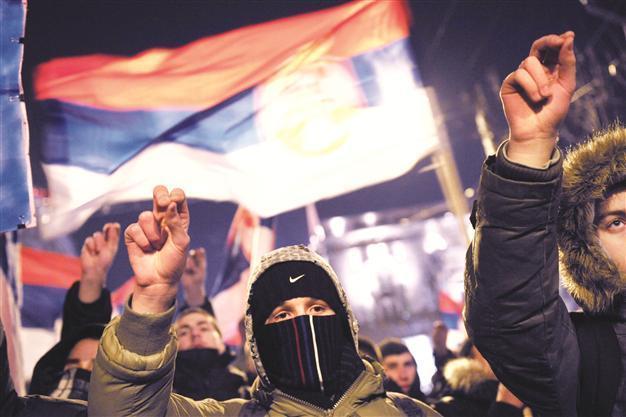‘Kosovo is ours’ was a lie, says Serbian premier minister
BELGRADE - Reuters

Serbian ultra-nationalists take part in a protest in Belgrade against the opening of jointly operated crossing points between Serbia and Kosovo in this photo.
Serbia does not recognize Kosovo but is under pressure to improve relations with its former province if the EU is to give the green light to accession talks. AP photo
Serbian Prime Minister Ivica Dacic told Serbs today they had been lied to that “Kosovo is ours,” the latest sign of an historic U-turn by Belgrade as it races to clinch membership talks with the European Union.
Dacic, who was an aide to Slobodan Milosevic when Serbia went to war with NATO over Kosovo, has entered into talks with the fledgling nation’s ethnic Albanian leadership. In a marked break from previous pronouncements, he said Serbia now had to finally define its “real borders.”
“For 10 years, Kosovo was taboo. No one could officially tell the truth,” he wrote in the Serbian weekly NIN. “Tales were told; lies were told that Kosovo is ours.” But today, he said, “the Serbian president cannot go to Kosovo, nor the prime minister, nor ministers, nor the police or army. Serbs can only leave Kosovo. That’s how much Kosovo is ours and what our Constitution and laws mean there.” Serbia does not recognize Kosovo, but is under pressure to improve relations with its former province if the EU is to give the green light to accession talks and to send a vital message of stability to much-needed foreign investors.
Comprehensive settlementDacic called last month for a comprehensive settlement after Kosovo’s government said its ultimate aim was to secure recognition of statehood by the United Nations. “We can agree on everything,” Dacic had said, adding that they were seeking a comprehensive settlement, but for that to happen something has to be conceded. “They [Kosovo] are pressuring us through the EU, and we’re not letting them into the United Nations. Are we supposed to go on sparring like that for years?”
Dacic’s text was published in NIN to mark the tenth anniversary next week of the assassination of Premier Zoran Djindjic, who took power after the 2000 ousting of Milosevic but was shot dead in 2003 by a group of former elite paramilitaries and drug smugglers. The killing slammed the brakes on Serbia’s recovery from the war and heavy sanctions that were both legacies of Milosevic’s 13-year rule.
“Ten years later, Serbia has yet to solve the problems that burdened Djindjic’s government. It still does not know where its borders are, over what territory it really has sovereignty,” Dacic wrote. “I was part of a government that tried to resolve the question of Kosovo by war. Perhaps there is some justice that today I should be the person most responsible for finding a peaceful solution.” The EU wants a deal by mid-April, when the European Commission is due to issue a report on progress in the Kosovo talks. The bloc will then decide whether to open accession talks in June. Serbia’s fellow ex-Yugoslav republic and wartime foe Croatia is due to become the EU member on July 1.
